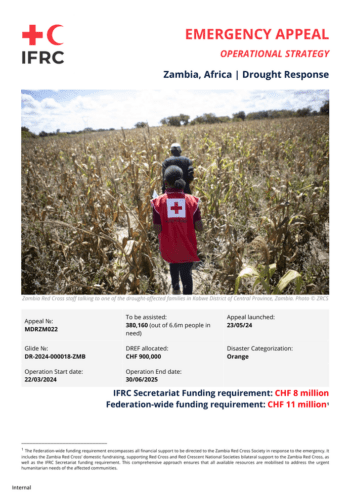Attachments
DESCRIPTION OF THE EVENT
Zambia is undergoing one the driest agricultural seasons in more than forty years, causing major crop and livestock losses and severely affecting the well-being and livelihoods of communities nationwide. According to ongoing reports from the UN, 84 out of 116 districts in the country have been affected by this crisis. The IPC report from August 20232 projected an estimated 58,000 people, between October 2023 and March 2024, to be in an Emergency condition (IPC Phase 4) and two million people in Crisis (IPC Phase 3) and requiring urgent humanitarian support. On 29 February 2024, the President of Zambia declared a national emergency due to the prolonged drought. On 16 April 2024, the joint rapid needs assessment 3 commissioned by the Agriculture and Food Security Cluster and the National Government Drought Response Appeal indicated that 6.6 million people were in need of urgent humanitarian assistance (33 per cent of Zambia’s total population according to World Bank data). This includes more than three million children under 18 years of age, mostly based in the provinces of Lusaka, Luapula, and the Western, Eastern, Southern, Central, and NorthWestern Provinces. According to the assessment report, the top three provinces with more than 1.3 million people in need are Western, Southern, and North-Western. The report also highlights that many households are struggling to meet their basic needs, including access to food, with many resorting to negative coping mechanisms. Although most of the surveyed households reported that they cultivated maize and other crops in the 2023/2024 season, projected production levels were minimal, and the majority of households reported total crop failure particularly due to the prolonged dry spells. Likewise, livestock and fisheries are equally affected due to the drying of water sources, almost half of surveyed households that kept livestock reported a reduction of pastures especially for cattle, while 39 per cent indicated that distance to water points increased. The country continues to recover from a cholera outbreak that began in October 2023, with over 21,000 reported cases. The decreased access to water has also led to outbreaks of diarrheal and other vector-borne diseases, exacerbating the health crisis. The IFRC, in support of the Zambia Red Cross Society (ZRCS), launched a Cholera Emergency Appeal in October 2023. Zambia has regions that are also prone to malaria, which could spike once bodies of water and water sources start drying up creating conducive breeding grounds for mosquitoes. In response to the compounding impacts of the drought in Zambia, the IFRC, in support of the ZRCS, is appealing for CHF 11 million (Federation-wide), to scale-up its operation initially funded by the DREF.
Source link : https://reliefweb.int/report/zambia/zambia-africa-drought-response-emergency-appeal-operational-strategy-no-mdrzm022
Author :
Publish date : 2024-07-23 17:12:58
Copyright for syndicated content belongs to the linked Source.
